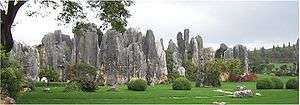Stone Forest
The Stone Forest or Shilin (Chinese: 石林; pinyin: Shílín) is a notable set of limestone formations about 500 km2 located in Shilin Yi Autonomous County, Yunnan Province, People's Republic of China, near Shilin approximately 90 km (56 mi) from the provincial capital Kunming.
The tall rocks seem to fall to the ground in the manner of stalagmites, with many looking like petrified trees thereby creating the illusion of a forest made of stone. Since 2007, two parts of the site, the Naigu Stone Forest (乃古石林) and Suogeyi Village (所各邑村), have been UNESCO World Heritage Sites as part of the South China Karst.[1] The site is classified as a AAAAA-class tourist site.[2]
Features

Shilin National Scenic Area (昆明市石林风景区) covers an area of 400 km2 (150 sq mi) and is divided into seven scenic areas as follows:
- Greater & Lesser Stone Forests (大、小石林) - also known as the Lizijing Stone Forest (李子菁石林)
- Naigu Stone Forest (乃古石林)
- Zhiyun Cave (芝云洞)
- Lake Chang (长湖 literally Long Lake)
- Lake Yue (月湖 literally Moon Lake)
- Dadie Waterfall (大叠水)
- Qifeng Cave (奇峰洞)
These formations, caused by the erosion of limestone, are believed to be over 270 million years old[3] and are a tourist attraction for both overseas and domestic tourists, with bus tours bringing tourists from Kunming. There are also a number of hotels in the area.
Culture
According to legend, the forest is the birthplace of Ashima (阿诗玛), a beautiful girl of the Yi people. After falling in love she was forbidden to marry her chosen suitor and instead turned into a stone in the forest that still bears her name.[4] Each year on the 24th day of the sixth lunar month, many Yi people celebrate the Torch Festival (火把节 Huǒbă Jié), which features folk dances and wrestling competitions.
Transportation
There are buses available from Kunming East Bus Station to the scenic site of Stone Forest, which takes about 1.5 hours to get there.Trains are also available from Kunming Train Station to Shilin Train Station, about 2 hours'train ride.[5]
History
Stone Forest was some 270 million years ago a shallow sea. Extensive deposits of sandstone overlain by limestone accumulated in this basin during the Permian period of geologic time. Uplift of this region occurred subsequent to deposition and exposure to wind and running water shaped these limestone ridges. These formations extend as far as the eye can see, looking like a vast forest of stone, hence the name "the Stone Forest".[6]
See also
References
- ↑ "Twenty-two new sites inscribed on UNESCO's World Heritage List, and one deleted during Committee meeting in Christchurch". UNESCO World Heritage Convention. June 29, 2007. Retrieved February 17, 2011.
- ↑ Chris Ryan, Gu Huimin and Fang Meng (2009). "Destination planning in China". In Chris Ryan and Gu Huimin. Tourism in China: Destination, Cultures and Communities (1 ed.). pp. 11–37. ISBN 9780203886366.
- ↑ Stone Forest from travelchinayunnan.com
- ↑ "The legend of Ashima (阿诗玛的传说)" (in Chinese). Yunnan Provincial Government Website. April 26, 2005. Retrieved February 17, 2011.
- ↑ "The Stone Forest" ChinaTour.net Accessed 2014-5-22
- ↑ http://www.uh.edu/~jbutler/kunming/stoneforest.html
Further reading
- A Virtual Field Trip to the Stone Forest, Kunming, Yunnan Province, China
External links
| Wikimedia Commons has media related to Shilin (Stone Forest). |
- Global Network of National Geoparks: Stone Forest Geopark (Shilin Geopark)
- Travelchinayunnan.com: Shilin Stone Forest Geopark webpage
Coordinates: 24°49′31″N 103°19′25″E / 24.82528°N 103.32361°E